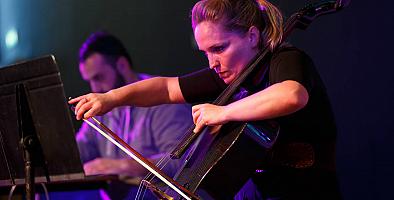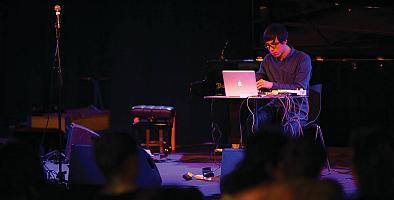BMus (Hons)
Popular Music
Content navigation menu
Why study BMus Popular Music at Goldsmiths
This ground-breaking degree embraces popular music in its many forms, and centres on exploration and experimentation in creative practice.
- This programme will allow you to acquire and develop a variety of skills, both individually and collaboratively, including musicianship and ensemble playing, songwriting, production and recording (at Goldsmiths Music Studios), composition and making music for film, and alternative sites for music.
- We have strong links with the music industry, employing professional musicians, producers, and artists as lecturers.
- We also present frequent, high-profile speakers from the music industry at our talks and events. Recently, these have included Dave Okumu, Nigel Godrich, Darkstar, Mica Levi, Matana Roberts, and Arts Council Music Relationship Managers.
- You’ll be very well set-up for the world of work. Employers look for initiative-driven graduates who think critically about their actions, work well with others and adapt quickly and creatively to new ideas. These ideas are written into the DNA of the degree, which will help you develop these skills.
- Through a collaboration with Matthew Herbert's Accidental Records we have created NX Records, an independent record label based at Goldsmiths, giving us the potential to promote our students' work on an international stage.
- You'll be within easy reach of South East London's many venues, as well as those across the capital, which provide a connection to music, art, dance, and theatre with an international focus, but also to local promoters, labels and the London-based music industry.
- You'll have the opportunity to perform at student-run showcases, in department ensembles, and at PureGold, our annual music festival that celebrates music created and performed at Goldsmiths.
Contact the department
If you have specific questions about the degree, contact Goldsmiths Department of Music.
UCAS code
W340
Entry requirements
A-level: BBB
BTEC: DDM
IB: 33 points overall with three HL subjects at 655
Length
3 years full time, or up to 6 years part-time
Fees
Home - full-time: £9250
Home - part-time: £4625
International - full-time: £20160
Department
Watch videos about this course
What you'll study
Year 1 (credit level 4)
In your first year you study a range of areas including creative and practical music studies, textual and contextual analysis of popular music, and an introduction to music technology.
All modules are compulsory at this level as we feel it is essential that all our students develop the necessary key skills and knowledge base before further specialisation.
| Module title | Credits |
|---|---|
| Songform | 30 credits |
| Popular Music Performance | 30 credits |
| Artistic Practices | 15 credits |
| Contemporary Music Industries | 15 credits |
| Popular Music Cultures | 30 credits |
Note about optional modules (if available): The above is indicative of the typical modules offered, but is not intended to be construed or relied on as a definitive list of what might be available in any given year. The module content and availability is subject to change.
Overview
You’ll do a range of compulsory practical and critical modules and, from your second year, design the focus of your own path of study, choosing from a wide range of modules, as well as have 1-2-1 instrumental/vocal tuition, participate in workshops, industry talks and events.
Teaching style
This programme is taught through a mixture of scheduled teaching, including seminars, one-to-one tutorials and performance lessons, practical workshops and music studio sessions. You’ll also be expected to undertake a significant amount of independent study. This includes carrying out required and additional reading, preparing topics for discussion, and producing essays or project work.
How you'll be assessed
You’ll be assessed by a variety of methods, depending on your module choices. These include coursework, examinations, group work, solo recitals, improvisation and group performances.
Individual vocal and instrumental tuition
Our location in London means that we are able to attract visiting instrumental and vocal teachers of the highest quality, with many of our staff also teaching at the major music conservatoires. We provide a generous allocation of tuition time. Our performance modules are supplemented with ensemble classes and workshops/masterclasses given by top professional musicians.
Entry requirements
We accept the following qualifications:
A-level: BBB
BTEC: DDM
International Baccalaureate: 33 points overall with three HL subjects at 655
UAL Extended Diploma: Merit overall
Access: Pass with 45 Level 3 credits including 30 Distinctions and a number of merits/passes in subject-specific modules
Scottish qualifications: BBBBC (Higher) or BBC (Advanced Higher)
European Baccalaureate: 75%
Irish Leaving Certificate: H2 H2 H2 H2
Additional requirements
You should be able to demonstrate skills and experience in both practical musicianship and music creation. Although we consider each application on its individual merits, we favour students who demonstrate clear experience of and/or commitment to music-making.
Please note that we do not accept applications for deferred entry.
Selection process
Selected candidates will be invited for an interview day. This allows us to meet potential students and find out more about their interests and abilities.
If you're invited for an interview, you will participate in a short workshop and be asked to present examples of your creative work (live and recorded).
If you are unable to attend an applicant day we may invite you to submit a portfolio of work. This is usually followed by an interview via Skype.
International qualifications
We also accept a wide range of international qualifications. Find out more about the qualifications we accept from around the world.
If English isn’t your first language, you will need an IELTS score (or equivalent English language qualification) of 6.0 with a 6.0 in writing and no element lower than 5.5 to study this programme. If you need assistance with your English language, we offer a range of courses that can help prepare you for degree-level study.
Alternative qualifications
See our full list of undergraduate entry qualifications.
Fees and funding
Annual tuition fees
These are the UG fees for students starting their programme in the 2024/2025 academic year.
- Home - full-time: £9250
- Home - part-time: £4625
- International - full-time: £20160
If your fees are not listed here, please check our undergraduate fees guidance or contact the Fees Office, who can also advise you about how to pay your fees.
It’s not currently possible for international students to study part-time if you require a Student Visa, however this is currently being reviewed and will be confirmed in the new year. Please read our visa guidance in the interim for more information. If you think you might be eligible to study part-time while being on another visa type, please contact our Admissions Team for more information.
If you are looking to pay your fees please see our guide to making a payment.
Funding opportunities
We offer a wide range of scholarships and bursaries, and our careers service can also offer advice on finding work during your studies. Find out more about funding your studies with us.
Additional costs
In addition to your tuition fees, you'll be responsible for any additional costs associated with your course, such as buying stationery and paying for photocopying. You can find out more about what you need to budget for on our study costs page.
There may also be specific additional costs associated with your programme. This can include things like paying for field trips or specialist materials for your assignments. Please check the programme specification for more information.
Careers
Careers for those with a music degree
Many of our graduates choose careers in fields related to their musical knowledge, such as:
- Teaching
- Performing
- Arts administration
- Music librarianship
- Publishing and retailing
- Record companies and production
- Technical work in radio or television
Statistically, music graduates demonstrate very good employment rates, because they are often highly trained in the kinds of transferable skills employers are seeking, such as individual motivation, team working and effective communication.
Find out more about employability at Goldsmiths.
Skills
You will develop specific musical skills including:
- Performance
- Composition
- Use of music technology
- Knowledge of a range of historical, contemporary, popular and world styles of music, and the debates and practices surrounding them
- Critical listening and score analysis
You'll also develop a wide range of key skills through both the practical and academic content of your degree, including:
- Communication (including public speaking, developing and presenting an argument, note taking, report writing)
- Analytical thinking
- Awareness of social, political and cultural processes
- Awareness of social and cultural difference
- Ability to take creative approaches
- Attention to detail
- Team work and collaborative practice
- The ability to undertake detailed research




